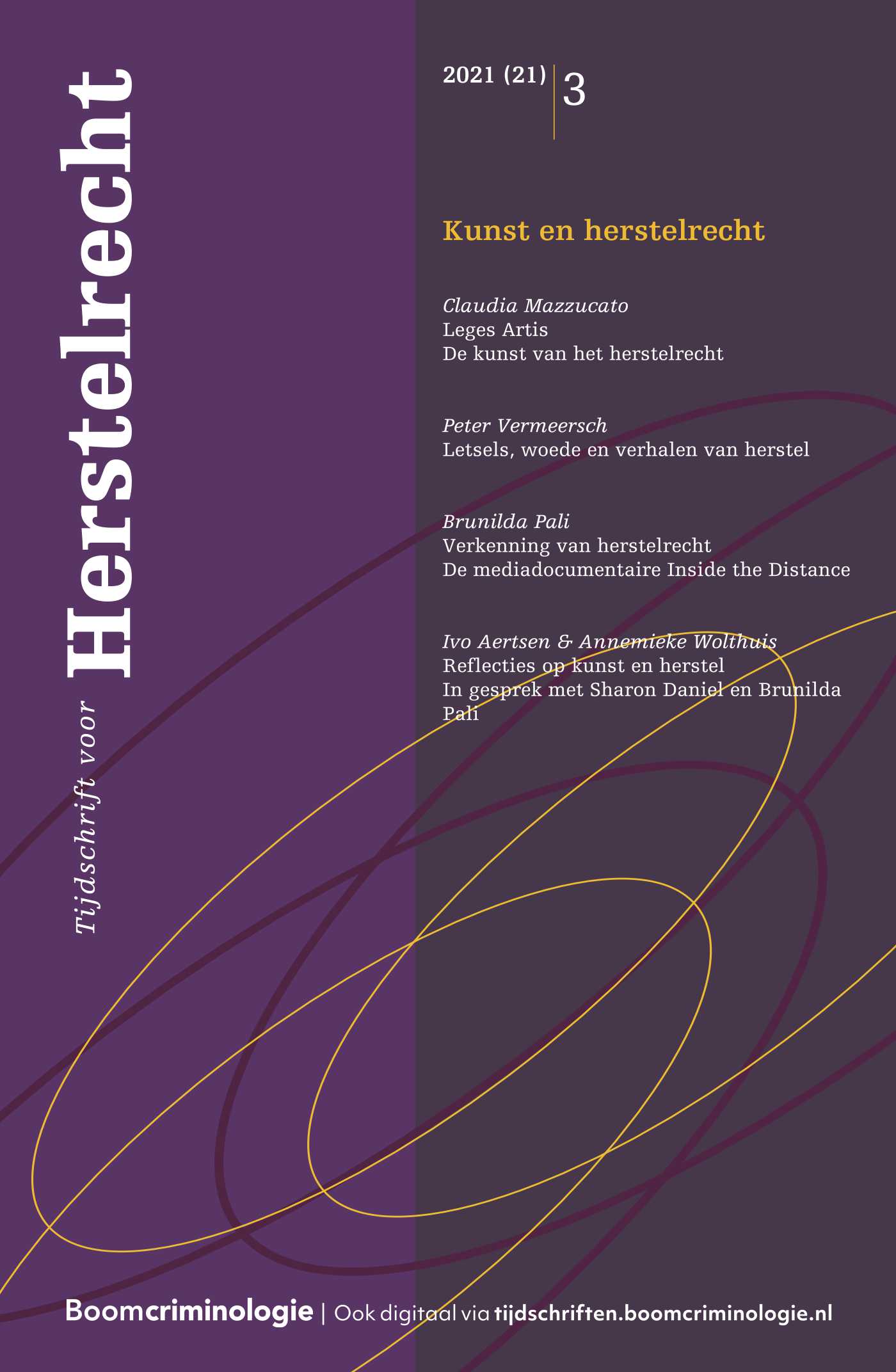|
The phenomenon of victim participation in restorative justice (RJ) has been studied from two main angles: describing victims’ motivations to take part in RJ and studying the benefits that different groups of victims may obtain when participating in RJ. However, methodological limitations of former studies have impeded to offer conclusive answers to the question ‘for whom is RJ’. This article offers insights into these issues, focusing on the descriptive findings of a mixed-method study carried out in the context of victim-offender mediation (in Spain and Belgium) and assessed before the encounter (if any) took place. Findings suggest that, before mediation, victims’ personal characteristics tend to differ. The factor ‘victim-offender relationship’ also appeared as an important variable. Implications of these findings are discussed. |


Tijdschrift voor Herstelrecht
Meer op het gebied van Mediation en herstelrecht
Over dit tijdschriftMeld u zich hier aan voor de attendering op dit tijdschrift zodat u direct een mail ontvangt als er een nieuw digitaal nummer is verschenen en u de artikelen online kunt lezen.
| Column |
Het beperkte belang van evidence-based onderzoek naar slachtoffers |
| Auteurs | Vincent Geeraets en Wouter Veraart |
| Auteursinformatie |
| Redactioneel |
Slachtoffers: wel of niet deelnemen aan herstelbemiddeling? |
| Auteurs | Bas van Stokkom |
| Auteursinformatie |
| Artikel |
Voor wie is herstelrecht?Een studie naar slachtoffers en (niet-)participatie |
| Trefwoorden | restorative justice, victim participation, victim-offender, mediation, victims’ motivations |
| Auteurs | Daniela Bolívar |
| SamenvattingAuteursinformatie |
| Artikel |
Slachtoffers en herstelrecht: ervaringen van (niet-)deelnemers |
| Trefwoorden | Victims, participation, restorative justice, Hergo |
| Auteurs | Inge Vanfraechem |
| SamenvattingAuteursinformatie |
|
This article describes some victim-related research results of both an action research into the Flemish practice of conferencing, as well as the results of a European comparative research on victim-offender mediation. Through these results, we examine what victims think of restorative justice and why they choose (not) to participate. This way, we aim to fill a certain gap in restorative justice literature especially when it comes to non-participating victims (Van Camp & Wemmers, 2016), a group which remains hard to interview. |
| Artikel |
Keuzevrijheid in herstelbemiddelingEen verkennend onderzoek naar niet-deelnemende slachtoffers |
| Trefwoorden | restorative justice, mediation, victim-offender contact, Victims, victim support |
| Auteurs | Dana Weistra |
| SamenvattingAuteursinformatie |
|
In the field of restorative justice (RJ), relatively much is known about victims’ reasons for wanting to participate in either mediation (as part of the criminal process) or victim-offender contact (parallel to the criminal process). Much less is known, however, about why victims refuse to take part in RJ services. The current article sheds light on this issue and is based on a joint exploratory research initiative by Victim in Focus and Victim Support the Netherlands. The results indicate that participation in mediation and victim-offender contact is significantly associated with the type of offense. Victims of traffic accidents participate significantly less often in mediation than victims of other offenses. In case of victim-offender contact, victims of violent crimes participate significantly less often while victims of traffic accidents participate more often than victims of other crimes. In addition, the referrer of the case and the victim’s age are also significantly associated with participation in victim-offender contact. When a case was referred through the judicial stakeholders, victims more often did not participate, whereas when victims registered themselves, it more often led to a form of victim-offender contact. With regard to age, victims younger than 25 were significantly less often willing to participate than older victims. The specific reasons victims mention for not wanting to participate in RJ are twofold: both emotional and pragmatic reasons are mentioned. The latter were most common with regard to both mediation and victim-offender contact: victims primarily wonder ‘what’s in it for me?’ and seem to base their decision on whether to partake in RJ on its answer. Mentioning emotional reasons not to participate was in case of victim-offender contact significantly associated with judicial referrers of the case, while such reasons were less mentioned when a case was referred through victim support in The Netherlands. To further explore these associations, more research is needed. |
| Artikel |
Onherstelbaar onrechtEen verkenning van de verhouding tussen recht en onrecht |
| Trefwoorden | victims, justice, injustice (experiences), intimacy, restoration |
| Auteurs | Antony Pemberton en Nanda Oudejans |
| SamenvattingAuteursinformatie |
|
In this article the authors reflect upon Judith Shklar’s classic book The Faces of Injustice. They maintain that injustice is wrongly confined to the absence or counterpart of justice. The authors discuss the relationship between and the difference between injustice and justice. According to the authors, injustice has more intensity than justice. Legal rules have only limited power to fight extreme forms of injustice. They argue that there is an asymmetry between justice and injustice, also because the law introduces values as predictability and regularity that, in concrete situations, are badly equipped to eliminate injustice. They claim that injustice is rooted in the idiosyncratic perspectives of those who suffered harm and argue that injustice has a ‘playful’ character, while the law has the character of a game. Finally, they argue that injustice is at the core an intimate experience, whereas justice is primarily about relationships between people. The authors outline the implications of these points for thinking about restoration and the relationship between restoration processes and the law. |
| Boekbespreking |
Straf: een reparatieve opvatting van ‘verdienste’ |
| Auteurs | John Blad |
| Auteursinformatie |
| Boekbespreking |
Slachtoffers: tussen intimi en vreemden |
| Auteurs | Alice Bosma |
| Auteursinformatie |
| Casus |
La Justice RestaurativeVerslag van het eerste internationale congres over herstelrecht in Frankrijk, Parijs, 17 & 18 januari 2017 |
| Auteurs | Annemieke Wolthuis |
| Auteursinformatie |
